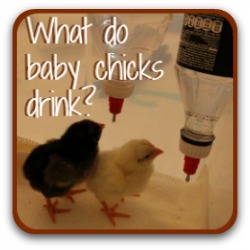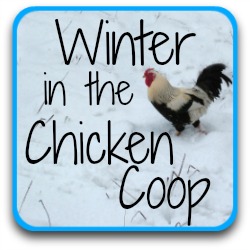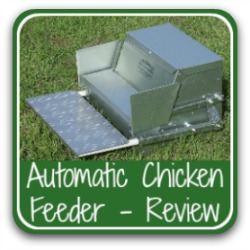Do chickens drink water? And if not, then what?
Chickens need water just as much as humans. Without it, the consequences are potentially fatal.
This article, based on properly researched studies, covers what and how much chickens need to drink, how they drink, and what kind of water is best to ensure their natural health throughout the seasons.
Just like humans, chickens are able to last much longer without food than without liquid.
And that liquid should be nothing more than plain, simple, natural, fresh water.
Water controls a chicken's body temperature, keeps cells and organs healthy, helps them digest food, makes sure their waste is easy to pass.
Without it, they simply won't survive.
And eggs are between 60% and 70% water(1).
Without a ready supply of drinking water, your egg supply will, literally, dry up.
But is all water the same? And if not, what kind of water do properly researched studies find chickens should drink?
If you purchase a product through links on this page, I may receive a small commission at no extra cost to you. I only recommend products I have bought (or would buy) myself, and which I believe will genuinely benefit you. You can read my full disclosure policy here.
When do chickens drink water?
There's lots of information online about how much chickens drink, and complicated calculations about how much to allow per chicken(2). Free ranging flocks, for example, are more active than hens kept in a small run, so will need more water.
But the simple fact is that you don't need to calculate anything. Just make sure your chickens have access to fresh water during daylight hours.
They do not need water to be provided once they have roosted.
How much water do chickens drink?
Don't ration it. Don't try to calculate how much. Chickens drink little and often and will work it out for themselves.
When they're thirsty, they drink. When they need liquid to moisten food so it doesn't form undigestible clumps in the crop, they drink. When they need water to cool down on a hot day, they drink.
If you don't provide water, they will find it anywhere they can.
 If you don't provide water your chickens will drink from anywhere they can find.
If you don't provide water your chickens will drink from anywhere they can find.Simple tips to keep your chickens healthy.
- Make sure they have access to water at all times during daylight hours.
- Once roosted they don't eat or drink, so there's no need to keep water in the coop, unless for some reason your flock is confined to quarters.
- In fact, water containers in the coop can lead to the air becoming damp, which is much more harmful to your flock than the cold.
Can chickens drink warm water?
If not, what temperature of drinking water is best?
Several studies(e.g. 3, 4) have looked at the effect of water temperature on chickens and found that the best temperature for drinking water is just below the body temperature of the bird.
A fully feathered chicken's core temperature is generally between 40ºC and 41.5ºC (105ºF and 107ºC). The ideal water temperature is about 13ºC (55ºF).
Anything much above or below this and you may find your chickens are reluctant to drink.
But you'll be glad to know you don't need to be paranoid about getting the water to exactly the right temperature.
Just make sure it's cool and fresh.
Can chickens have ice water?
Studies have shown that drinking chilled (not iced) water in very high temperatures improves feed intake, egg production, shell quality and the ability to withstand heat stress(5).
But chickens won't eat ice! The best way of making sure your chickens' water is "chilled" is by adding blocks of ice to their usual drinking water morning and afternoon, and allowing it to melt slowly.
Do this only when temperatures are very high though. The most important thing is that your flock is kept hydrated in hot weather – not iced!
Try offering some healthy frozen treats too – they can help add nutrition as well as hydration.
You'll find a recipe for a simple frozen chicken treat here.
Keeping water cool and plentiful in summer.
Chickens use water to help control their body temperature in summer(6). The higher the temperature, the more they drink: studies note as much as a 7% increase in water consumption for every degree Fahrenheit increase in temperature(5, 7).
Again, there's no need to work out percentages or amounts. Use common sense. There are many effective ways of helping your flock deal with the effects of heat exhaustion – water is just one of them.
As far as water and heat is concerned, here are some simple, practical tips.
- Make sure you have different waterers placed at various points around your run. Don't make your flock have to travel too far to reach them!
- Always place waterers in the shade to help keep the liquid cool, and refresh the water at least twice a day.
- Freeze blocks of water in a plastic container each evening. In the morning, place the blocks of ice into the waterers. As it melts, it will keep the water cool.
- Use foods with a high water content as frozen treats: try watermelon and grapes, and remember that frozen treat recipe.
 Some of my flock tuck into a slice of frozen watermelon.
Some of my flock tuck into a slice of frozen watermelon.- If the temperature is soaring and your chickens are obviously suffering, use an electrolyte mixture to help keep them hydrated.
- Do not use apple cider vinegar in water during hot weather. It raises chickens' temperature, which is the last thing you want to do!
Do chickens drink warm water in winter?
No, chickens don't like drinking warm water(6).
The biggest issue for chickens' water in winter is making sure it doesn't freeze. It's always a hot topic among chicken keepers in the winter months. Here are some simple tips.
- Don't put water inside the coop, even in freezing weather. Humidity is a real issue in colder months and can cause frostbite.
- If you have electricity in or near your run, consider buying a heated waterer.
- Make sure it's a product like this one, which only kicks in when temperatures drop below freezing. This two gallon container has three different drinking points and will cope with up to 13 chickens.
- The water is kept unfrozen but not warmed.
- If you don't have electricity, you'll need to do it the old-fashioned way: check the waterers regularly and replace frozen with fresh.
- Alfalfa tea: for extra energy in the winter, soak a handful of alfalfa leaves in a bucket of hot water for twenty minutes. Strain, allow to cool and offer to your flock in standard waterers.
Can chickens drink salt water?
Absolutely not!
Chickens suffer from salt intoxication very quickly. They simply cannot deal with salt and if given a choice, they will choose not to drink it.
So if you've read advice on the internet to put salt in your flock's water in the winter to stop it freezing, please don't do it.
You might have unfrozen water, but you're likely to have dead chickens.
Do chickens drink rain water?
They can, and do.
 It's important to make sure buckets catching rain water are kept free from bacteria.
It's important to make sure buckets catching rain water are kept free from bacteria.The critical issue here is make sure the water is kept free from toxins like green algae, rotting matter such as leaves, and contaminants like poop, particularly droppings from rodents.
Any of those can cause a number of diseases, from algae poisoning to botulism. It's a recipe for disaster, sooner or later.
To avoid it, make sure any water containers are sterilised every two weeks.
Don't use bleach if you can help it. It's bad for the environment, and traces of it aren't good for chickens, either!
Use a plant based sterilising solution instead.
Should chickens drink anything else?
There are some studies which show that chickens can drink goats' milk. However, poultry are actually intolerant of lactose, which can cause liver problems.
There's no reason to give your chickens anything apart from fresh water. Save the milk for your family!

Other pages you might find useful.
Sources.
1. Parkinson, T. L.: The chemical composition of eggs. Pub. Journal of the Science of Food and Agriculture, 1966.
2. Gardiner, E. E. and Hunt, J. R.: Water Consumption of Meat Type Chickens. Pub. Canadian Journal of Animal Science, 1984.
3. Carter, T. A., and Sneed, R. E.: Drinking water quality for poultry. Pub. North Carolina State University, Department of Poultry Science, 1987.
4. Waggoner, R. et al: Water Quality and Poultry Performance. Pub. American Veterinary Medical Association, 1984.
5. Gutierrez, W., et al: Effects of Chilled Drinking Water on Performance of Laying Hens during Constant High Ambient Temperature. Pub. Journal of Animal Sciences, 2009.
6. Degen, A., and Kam, M.: Roosters Prefer Cool Drinking Water in Both Summer and Winter. Pub. Journal of Applied Poultry Research, 1998.
7. Fairchild, B. D.: Poultry Drinking Water Primer. Pub. University of Georgia, 2015.
8. Ross, P.A., and Hurnik, J.F.: Drinking behaviour of broiler chicks. Pub. Applied Animal Ethology, 1983.
















